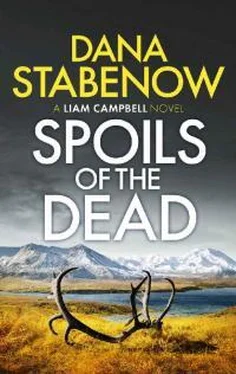The nineteen-hundred-foot airstrip at Blueberry Bay was built on a gravel spit that separated a lagoon from the Bay, attended by a few dozen houses and cabins scattered between the water’s edge and halfway up the nearly vertical hillside the airstrip dead-ended in. Not a strip she would take for granted, not without multiple touch-and-goes for practice first. The community consisted of 103 people and was according to the last census a hundred percent Sugpiaq, although it had originally been a Russian fort under Alexander Baranov’s tenure as Catherine the Great’s Alaska exploiter-in-chief. Recently the citizens of Blueberry Bay had unilaterally reclaimed the settlement’s original Sugpiaq name of Chuwawet, and were now in the process of convincing the US Postal Service they had the right to call themselves what they wanted to and still have their mail delivered.
Deeper into Blueberry Bay, Engaqutaq had a two-thousand-foot airstrip on a hill the top of which had been sliced off specifically for the purpose. Black spruce clustering menacingly on three edges as if just waiting for the starter’s pistol to sound before they reclaimed their territory from its two hundred residents. The edge closest to the water was lined with—she dropped down for a look, and then circled back for another look. Yes, those were headstones. Engaqutaq had a cemetery off the edge of its airstrip.
Most of the houses in Engaqutaq paralleled the strip, the way Alaska villages had been built in the old, more sensible days, when all you had to do was hop out of your plane and walk across the strip to get to your front door. After statehood the FAA had brought in a bunch of federal money and most of the airstrips had been relocated to five or ten miles out of town, among other things introducing allegedly better aids to navigation, along with the unintended consequence of wheeled vehicles, not to mention driver’s licenses, to the Alaskan Bush. Engaqutaq had originally been a US military fort of much more recent origin than neighboring Chuwawet’s Russian fort, rapidly succeeded by a herring cannery and then, when the herring were fished out, a salmon cannery, astonishingly still in operation. Wy had thought that all salmon were fresh frozen nowadays.
She dropped down to fly low and slow at a hundred feet above the strip, and even on this clear, calm day there were thermals enough to raise a few bumps. It would be an interesting approach in real weather. A couple of kids ran out of their houses and waved furiously. She waggled her wings and was up and over the ridge to the east, which revealed a much longer, narrower body of water forcing its way far more deeply into the Kenai Mountains. According to the chart this was called Mussel Bay, Wy assumed for the obvious reason, with a small town perched on its northeast shore.
Kapilat was a comparatively substantial community of three hundred people, with a summer population that filled the vacation homes built on pilings along the opposite shore, some of which harbored pretensions of McMansion status. The mountains rose around the narrow bay in four-, five-, and six-thousand-foot knife-edged peaks clad in an omnipresent layer of ice and snow that grew or receded with the season. Above the head of the bay their snowmelt emptied every summer into a small river whose flow had over the millennia carved a cramped chasm with multiple narrow falls alternating with gravel beds created by the moraines of retreating glaciers.
Wy banked left and turned back down the bay, coming down to a hundred feet to take a look at the airstrip. Like all the other strips on this side of the Bay it was unattended and unpaved, two thousand feet carved out of the side of a foothill with a salt water slough paralleling it. There was no traffic so she dropped down for a touch and go. As in Chuwawet the thermals made themselves felt, but the surface was well-maintained and there were half a dozen hangars, which she would bet belonged to the McMansion owners on the other side of Mussel Bay. She lifted off gently at the other end and banked left over a road on a dike that divided the slough from another slough that debouched into the Bay proper. She climbed back up to a thousand feet and debated her course. There was much more of the south shore to explore, the chart showing multiple tiny coves and narrow bays and shallow lagoons.
But across the Bay, Liam waited. Across the Bay was Blewestown, a community of ten thousand people spread along the Sterling Highway from Cook’s Point to the Wolverine River delta that formed the easternmost end of the bay. Blewestown’s primary reason for being was the aforementioned four-mile gravel spit, a spit that had been washed clean by the tidal wave that followed hard on the heels of the ’64 quake and was therefore, so to speak, open for business. From the sale of Alaska to the US in 1876 to 1960, Westerners had been trying to make a living in and around Blewestown without much success. There was gold, but nothing to compare to the Klondike or Nome. Fox farms and cattle ranches came in with fanfare and failed in obscurity.
The biography of the town’s namesake had made for an entertaining read. George Blewes had been the third lieutenant on HMS Endeavour when Captain Cook sailed into the now eponymous Cook Inlet. In 1896 his descendant, Albert Owen Blewes, of whom report held that he never walked a straight line where a crooked one was available to him, began his career in his native land with multiple petty thefts while he was still at school. Returned forthwith to his appalled parents, he continued with the selling of legal documents proprietary to the London solicitor to whom he was apprenticed, embezzlement of the shipping firm where he was later, albeit briefly, employed, and an illegitimate child. This last had evidently been the proverbial straw, as immediately thereafter his family handed him a one-way ticket to New York and did not wave their tear-stained handkerchiefs from the shore as he sailed from Southampton, off to make his fortune in the New World. Wy wondered what had happened to the child.
In New York City, Blewes spent his first year in America leasing land in Wyoming to which he held no title. Fortuitously for Blewes, right about then gold was discovered in the Yukon and like all good confidence men of that day Albert yielded to its siren song and lit out for the territory of Alaska, by all accounts one step ahead of the bloodhounds. In Dawson City, sticking to what worked for him, he made a fair bit of money leasing gold prospects he did not own. As was his invariable habit, he beat feet out of Dawson one step ahead of the law, arrived in Nome to spend just enough time for Wyatt Earp to issue him a blue ticket south, and rode Alaska Steam down and around the west coast to the Kenai Peninsula, where in 1910 he was put forcibly ashore in Chungasqak Bay for nonpayment of gambling debts. Later he claimed that the voice of his lauded ancestor had called out to him from the very shores.
Always a charmer, as grifters invariably are, he managed to raise enough of a stake to buy most of the land at the head of the spit and much of the spit itself, after which he created a real estate prospectus filled with beautiful pictures and exclamatory phrases like “Thick stands of virgin timber as far as the eye can see!” and “Land so fertile it will support any crop!” He talked himself aboard the next Alaska Steam ship bound for Seattle and took a train back to New York City where, against the better judgment of all the people who remembered him from his last visit, he sold everything he held even partial title to in Blewestown and much that he didn’t. The only thing he left behind was his name on the town, because certainly he never saw it again.
For the next hundred years the prospectors and fox farmers and the cattle ranchers came and went, while the fishermen came and some of them stayed, but Blewestown remained the Bay’s stepchild, no more than a fuel stop for the steamships who put into the one dock, where the tracks of the little railroad which began in the coal seams of the bluffs ended.
Читать дальше












